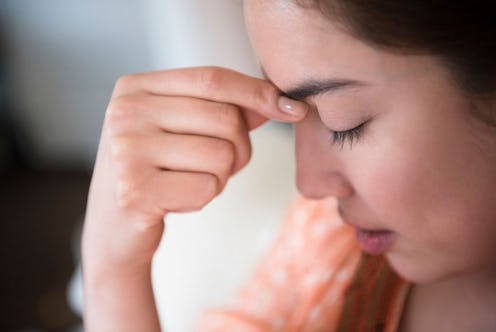Life
These Everyday Things Could Be Causing Your Headaches & It's So Unexpected

Who amongst us hasn't experienced a headache after a whole day in front of the computer, or a night dancing to music that's just a little too loud? It's fairly easy to identify the probable cause of a one-off headache, but if they're chronic, there might be an underlying issue behind them. Constantly Googling, "Why do I keep getting headaches?" It could be down to one of these somewhat unexpected reasons.
Firstly, it's important to stress that you should consult a GP if you're experiencing frequent headaches or migraines. (Unsure of the difference? The NHS describes a migraine as "a moderate or severe headache felt as a throbbing pain on one side of the head," which might be accompanied by sensitivity to light or sound, nausea, and vomiting.) But if your doctor's confident your headaches aren't symptomatic of a more significant health problem, you might look to your daily life to figure out the cause. Are you a dedicated consumer of cheese? Do you approach your daily run like you're being pursued? Do you push yourself to exhaustion during the work week, only to sleep in for hours on Saturday mornings? You might just have found the cause of those headaches.
1Your Bra Doesn't Fit
Didn't anticipate that one, did you? According to Cosmopolitan, "wearing unsupportive bras can cause headaches because it means that your neck and back muscles have to work twice as hard to hold up your boobs." Harper's Bazaar says that 80% of bra-wearers are choosing the wrong size, so it might be time to book a fitting.
2You Worked Out Too Intensely
"When you exercise, or exert yourself physically, the muscles of the head, neck, and scalp need more blood to circulate. This causes the blood vessels to dilate," WebMD explains. The result can be exercise headaches, or "exertional headaches"; they're common in runners, who often experience "jogger's headache". These headaches are often harmless, but the Mayo Clinic warns that "secondary exercise headaches," which can persist for a day or more, could be an indication of a serious issue in the brain. "If you experience a headache during or after exercise, consult your doctor. Call your doctor right away if the headache begins abruptly or if it's your first headache of this type," the Mayo Clinic advises.
3You Slouch A Lot
Spend a lot of time hunched over a laptop, or slouching in your desk chair? That could be causing neck, shoulder, and upper back tension, leading to — you guessed it — headaches. "Typically, the pain throbs in the base of the skull and sometimes flashes into the face, especially the forehead," the NHS explains. How to fix it? Sit up straight, use a headset when you're on the phone, and switch positions regularly, the NHS recommends. If the problem persists, try seeing a physical therapist.
4You're Eating Particular Foods
WebMD flags several types of cheeses, particularly aged ones, as migraine triggers (I'm so sorry). Other problematic foods? Deep breath: chocolate, nuts, yoghurt, kefir, onions, beans, tomatoes, corn, citrus fruits, apples, and bananas. Alcohol and processed meats can also cause migraines. WebMD's advice to frequent migraine sufferers: "learn your triggers and do your best to avoid them."
5You Slept In Too Long
Bafflingly, it can actually be the relaxation after intense stress that causes headaches, rather than the stress itself. According to the NHS, "as the tension of the week subsides, your levels of stress hormones drop, which causes a rapid release of neurotransmitters (the brain's chemical messengers). These send out impulses to blood vessels to constrict and then dilate, which causes a headache." How to avoid it? Try to relax throughout the week, instead of saving it for the weekends — and you might have to sacrifice that lie in.
6You Have An Anxiety Disorder
The Anxiety and Depression Association of America (ADAA) says that experiencing chronic headaches and migraines is a common indicator of an anxiety disorder. What's more, some studies have suggested that "a common predisposition to anxiety disorders, depression, and migraines may exist." If you're not receiving medical treatment for your anxiety disorder, or you suspect anxiety might be triggering your headaches, be sure to speak to your GP.
7You Bottle Up Your Anger
"When you're angry, muscles in the back of your neck and scalp tense up, causing a tight band-like sensation around your head," the NHS explains. The result? A tension headache. Deep, controlled breathing (the classic "in through the nose, out through the mouth") can help manage anger in the moment, while the NHS offers further anger management tips should it be a recurring issue, including consulting a therapist.
So that's the truth of it: a few lifestyle changes might solve your headaches for good, whether that's limiting your pizza intake or buying a properly fitting bra. But a vital reminder: if your headaches are a chronic issue, or they're interfering with your daily life, see your GP, if only to rule out something a bit more serious.